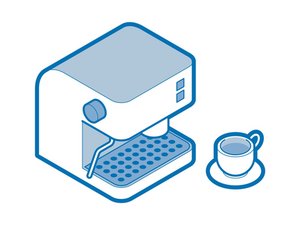Introduction
Troubleshooting your coffee maker before you've had your cup of coffee can be frustrating. Let's dig into this troubleshooting guide to get your morning cup brewing and start the day off right.
While this guide is focused first on automatic drip coffee makers, a good starting procedure for any device is to follow proper maintenance and cleaning practices — follow this coffee maker cleaning guide and replace old filters.
If your water is soft, you should treat them with a suitable descaler every three months, or once a month if the water is hard. White vinegar is not recommanded as it can damage seals and the metal.
Causes
Your coffee maker will not work without water. Open the top lid of the coffee maker and check that there is enough water to brew your coffee. Additionally, there is a water-level gauge on the front side of the pot that displays the water in the machine. If there is not enough water to use, add more water and try brewing again.
There is a possibility that your coffee maker refuses to work because the filter is off-centered or unbalanced. Open the top lid of the machine and reposition the filter. If the problem continues, then the filter may be misshapen and need to be replaced.
If this is the problem, find a new filter at the nearest home appliance store.
It is also possible that pipes are blocked by limescale. If you are lucky, thorough descaling will help. Only use a suitable product; vinegar is not recommended. Follow the instructions on the descaler. Then rinse everything with fresh water.
If your machine will not turn on, it is possibly clogged with minerals from your tap water. If you are lucky, thorough descaling will help. Only use a suitable product; vinegar is not recommended. Follow the instructions on the descaler. Then, rinse the machine out with water and attempt to brew another pot of coffee.
While regular cleaning helps prevent mineral clogging, buildup may still occur. A clogged machine will not be able to move water and brew coffee. Remove your bottom plate to access the water lines. The hoses can then be removed and visual inspected for buildup. Clean with soap and water and a small brush.
This is time to inspect the ball valve. This valve allows fluid to move forwards but not backwards, and can be tested in two ways. Shaking the valve will tell you if the ball is free and is a good sign it's functioning. If you remove the valve and can only blow air in one direction, the valve still works. If you cannot blow in either direction, clean the ball, and reassemble the valve.
It is possible that the machine is not working properly due to lack of power. Check your home’s breaker box and make sure that the circuit is on and working. If it has turned off, then reset the circuit breaker. If it is still malfunctioning, replacement of the power cord may be necessary.
See our Power Cord Replacement Guide.

- 15 - 20 minutesModerate
The thermostat is a safety switch which electronically energizes the heating element while there's water in the tank, and disconnects or opens the circuit after the water is gone and it's only heating itself. Unplug your machine, grab a multimeter, and open the bottom cover. If the thermostat continuity tests at room test between 0-1 Ohm (Ω) then it doesn't need replacing.
Find and test the inline fuse. The fuse is a safety device designed to fail in the event of a runaway thermostat. If the fuse tests outside of 0-1Ω, replace the fuse.

- 5 minutesEasy





